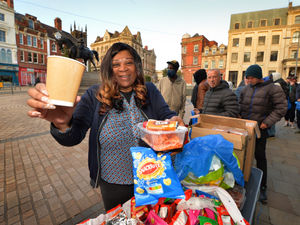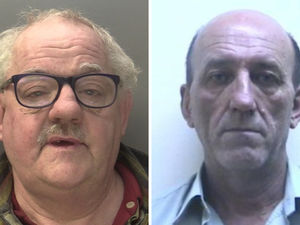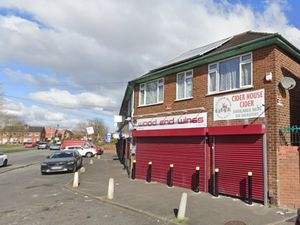Meet the 'godsend' who gives out hot meals to those who can’t afford to cook for themselves
As the autumnal sunshine starts to fade, the temperature begins to drop. And the queue grows and grows.

“We’ve given out 72 hot meals tonight,” says Maria McKellar, as she prepares to pack up for the night.
“We had a few left at the end, and we had to tell them that all we had left was crisps and chocolate.”
Maria, a 60-year-old expert in IT security, has become a familiar sight in Wolverhampton’s Queen Square during the early evenings.
Four nights a week, after finishing work, Maria and her team of volunteers roll-up next to the ‘Man on the Horse’, and hand out out free hot food to those who can’t afford to cook for themselves.
And the soaring cost of energy has led to a sharp increase in the number of people joining the queue.
“Twelve months ago, on a busy night, we would have had 45-50 people coming to us, depending on the weather, so there has been a big increase,” she says.
Tonight, spaghetti bolognese is on the menu, made from pasta supplied by a local temple, and mixed with mince at her home.
Maria largely funds the operation out of her own pocket, although she does receive donations from local businesses and charities which provide her with help.
“We’ve got the cost of the meals down to about 75p each,” she says.
“It was 50p, which shows how much the cost of everything has risen.
“I will keep on going as long as I am able to do so.
“I believe, as a Christian, that every time I give, something comes along for me. When my urn broke, somebody came along and gave me a new one.”
Maria and her volunteers are out in Queen Square from 5.15pm every Monday, Tuesday, Wednesday and Friday, with other groups in the city making up some of the other days.
Jim, not his real name, says he comes to pick up his food from Maria three nights a week.
He says his problems began when he lost his job as a groundsman on a building site five years ago.
“I lost my house, my missus, and my kids, everything,” he says. “Then I was diagnosed with cancer in the neck.”
The 47-year-old is full of praise for Maria’s work, saying she is a huge help.
“She’s a godsend,” he says.
Nigel, 55, says he has been homeless since the start of the Covid outbreak, when his landlord sold the property he was living in. He says: “Maria put me in an hotel. She’s wonderful, if it wasn’t for her I would have been starving on the streets.”
Maria has been volunteering to help the hungry and homeless for the past nine years, initially going out around the city offering tea and coffee. In the past she has worked with the city’s Good Shepherd Ministry, and also operated out of the Darlington Street Methodist Church before it closed.
But two-and-a-half years ago, at the time of the first coronavirus lockdown, she noticed a growing trend of people who had received parcels from the food bank, but were unable to cook them.
She set up her own not-for-profit community company A Future For All UK.
“We have found there is a growing subset of people who are already in the nightmare situation of being unable to afford to use their cooker therefore eat the items from their food parcels, and bring tins to me as a sort of swap,” she says.
Maria says she cooks a lot of the food that is brought to her at her own home, before taking it in her car up to Queen Square. A number of mosques and temples also cook hot meals in their kitchens, while chip shops and other food outlets also help out. Maria uses pizza-delivery style thermal bags to keep the food hot.
Eventually, Tony Wortley, who kept Tony’s Deli and Alice’s Tea Rooms in Queen Square, got wind of what she was doing, and started giving her his left-over sandwiches at the end of each day. Then, for 18 months, he allowed her to use his premises in the evening, but the shop closed earlier this year and is now empty.
Maria says she has now made an offer to lease the vacant shop, but is waiting to hear from the council. She says she has inquired about a number of properties in the city centre, and even offered to invest in fitting a lift to one of one, but has so far drawn a blank in finding a home for her operation. So, for the moment, she operates on a table outside the empty cafe.
She reckons about a third of the people who come to her are living on the streets, and another third are temporarily living with friends or relatives. The remainder are people who have simply fallen on hard times.
Does Maria fear that any of the people who turn up are simply exploiting her good nature? She says the system largely polices itself.
“If anybody comes and lies, then somebody will soon know and say something about it,” she says.
“When we were down the church, about three years ago, somebody came in a car, and they all told me about it.
“But when I went out to speak to me, it turned out he had just lost his job, and the company car was going back.
“After that, he came on foot, and you could tell the difference between how fresh-faced he looked when he had a job, and how he changed after that. That’s the distressing bit, seeing how people change when they lose their jobs.”





